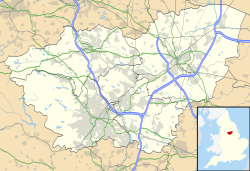| Cawthorne | |
|---|---|
 The post office in Cawthorne | |
Location within South Yorkshire | |
| Population | 1,151 (2011 census) [1] |
| OS grid reference | SE284079 |
| • London | 150 miles (240 km) |
| Civil parish |
|
| Metropolitan borough | |
| Metropolitan county | |
| Region | |
| Country | England |
| Sovereign state | United Kingdom |
| Post town | BARNSLEY |
| Postcode district | S75 |
| Dialling code | 01226 |
| Police | South Yorkshire |
| Fire | South Yorkshire |
| Ambulance | Yorkshire |
| UK Parliament | |
Cawthorne is a village and civil parish in the Metropolitan Borough of Barnsley, South Yorkshire, England. The village was once a centre of the iron and coal mining industry; today it is part of an affluent commuter belt west of Barnsley. At the 2001 census it had a population of 1,108, [3] increasing to 1,151 at the 2011 Census. [1]
Contents
The name Cawthorne derives from the Old English caldþorn meaning 'cold thorn'. [4]
The village pub, the Spencer Arms, is named after the Spencer-Stanhope family, who once owned large swathes of the local area. Their home was Cannon Hall, the park of which borders the village. [5]
Two earlier residences in Cawthorne were Barnby Hall, home of the Barnby family, and Banks Hall, the seat of the Misses Spencer-Stanhope and of a branch of the Greene family. [6]
Cawthorne is frequented by ramblers as many walking routes start from the village. [7]
The Victoria Jubilee Museum, built to commemorate Queen Victoria's Golden Jubilee, was opened in 1889 and contains numerous unusual exhibits including a stuffed cheetah and a two-headed lamb. [8]
All Saints' Church overlooks the village, and there is a Methodist church on Darton Road. All Saints contains memorials to the Barnby and Spencer families. [9] [10]
In the heart of the village stands Malt Kiln Row, originally the malt kiln for Cannon Hall. [11]
Kate Rusby, English folk singer-songwriter, lives in the village with her husband and two children.

